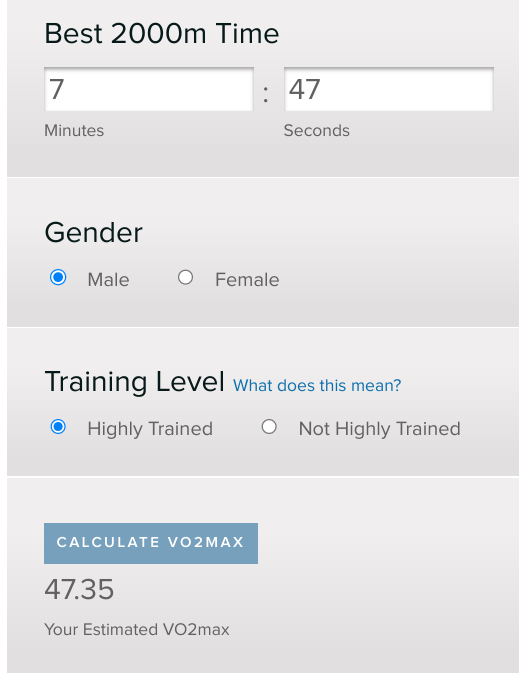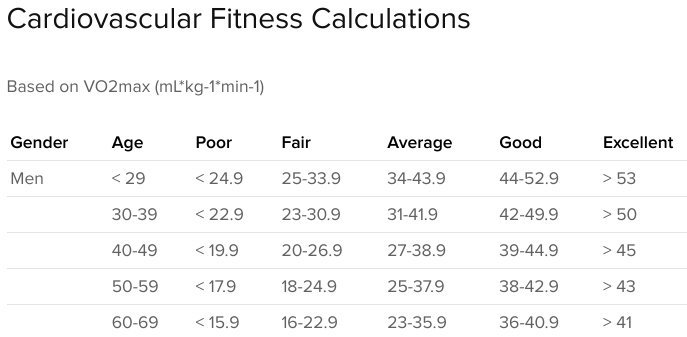Neo
#81
Any sense for how accurate the VO2 max predictors are?
(I remember there being a massive delta between my Garmin and Apple Watch before the pandemic just writing them off as not accurate)
I watched a few YouTube comparisons of the watches vs. lab Vo2Max analysis which suggested around 7% variation between the two, which would be good enough for me to get a rough idea of how I’m doing relative to my goals. But I have not seen any scientific papers comparing the watches vs. lab analyses. Would be interesting to see.
See this post: Exercise, VO2 max, and longevity | Mike Joyner, M.D - #191 by RapAdmin
2 Likes
Lost
#83
Cited in the post I was replying to:
(https://www.ahajournals.org/doi/full/10.1161/CIRCULATIONAHA.121.058162)
Note, again, that my comments are in reference to these results, and one needs to consider the full breadth of research.
1 Like
Neo
#84
Just please do take into account that also in this case many of the controls are not healthy and def not representative optimizers of health and longevity - with a lot of the studies in the meta analysis being
compared to age- and sex-matched controls from the [mostly US it seems?] general population
I think you are making a big mistake in the automatic assumption that most people engaging in high level of exercise are otherwise living a healthy life style. There is no study that I know that proves this. From my own experience over the years, attendings hundreds of MTB races, interacting with several hundreds of amateur athletes and having my biker friends I can tell you that is absolutely not the case. Great majority in fact uses their exercise to justify eating junk food and abusing alcohol. They couldn’t care less about eating healthy. Some of them are actually obese. Ever heard the term the donut ride ? So if there is a healthy user bias I have not seen it, but if you have some studies or evidence of it, I would be curious to see it.
1 Like
The accuracy is not really that relevant, as long as it is consistent and allows you to track the delta, that is most important.
1 Like
I have a Comcept 2 rowing machine used as the high standard for land based Olympic and amateur rowers. They have a nicely designed web-page VO2max Calculator for Indoor Rowing | Concept2 with an FAQ and rationales for their readings.
Anyways, I jumped on the dusty rower. (I haven’t used it in a while as it has been my mild winter and I run instead). And low and behold - as predicted by @desertshores, excessive bragging results!

If I choose the highly trained training level (which I am not) - then my VO2 max declines. That was counter-intuitive but the FAQ on the page explains this as …“an athlete with a high anaerobic threshold may perform better than another, despite having a lower VO2max. It’s possible that this comes into play with untrained individuals: since they lack training, they may depend more heavily on their natural anaerobic capability.”
So where does that put me in terms of a 69 year old male sort of healthy guy with a VO2 max of 47.35? (thanks for asking!)

Given the responses and range of views expressed in this topic, my personal view is that VO2 max is a distraction and irrelevant to the health and promotion of vibrant aging. Peter Attia is distilling a vague output measure and because he has such a broad influence, his view is not helpful for the majority of folks who need minor adjustments to their environments to have powerful gains in health.
In my own case, I have not seen a decline in strength or VO2 max primarily because I am a shlubby active not elite guy. Haven’t over-trained and not elite. All the “elites” are disappearing from my age group category - just gone. And I’ll be gone too - just don’t know when.
3 Likes
Lost
#88
Thanks.
Again, I was asking about the interpretation of a single paper – such a question obviously can not be answered by linking to a completely different paper. That’s OK since it was minor point – I was only curious whether I had missed something in my reading.
I don’t know how to interpret the athlete review at all, at least in any way that’s useful to me. Selection bias is a real bear. But the bottom line that elite athletes live longer than average isn’t too surprising, because elite anythings live longer than average. So high level athletes get a small boost, but they’re still outlived by high level chess players. (To be fair, the difference is not significant by that paper’s tests.) I’m not aware of direct comparisons, but I’d bet that the athletes’ longevity is similar or less than that of national legislators (elite politicians) or nobel laureates (elite academics).
6 Likes
no statistically significant difference in the RS of GMs (RS [95% CI]: 1.14 [1.08–1.20]) compared to OMs
Interesting but not the greatest study when you have 10x the amount of OM vs GMs, data is obtained from various public sources and survival is measured at 30 and 60 years since getting a title ?
Perhaps GM’s have protection against dementia or maybe they are more athletic that we all ASSUME.
But yes, brain training is part of the longevity plan.
1 Like
Bicep
#90
I have no medical training at all, so this is an actual question. Is it possible to improve lung capacity with any kind of training at all?
1 Like
well said. Myself I’m in the upper range of average (for 60-69 age group) per your table. VO2 max comes from the fitness app on my apple watch. I suspect my VO2 max was throughout my life either average or even a bit below average as a teenager. That said, I have not met a person in the last ten years in my age group who is as quick ( can move as quickly and with such quick reflexes) as healthy and as flexible as myself. Further, I very rarely see people of any age who can match me in these respects. In conclusion, maybe some of us are not made to be top tier fitness performers and trying to obsessively focus on max VO2 performance vs the balance - CR+ rapa+ daily moderate exercise is just counterproductive?
1 Like
I agree that max performance, like dosage of a drug, has to be applied astutely to the individual over decades to see how it plays out for long-term health. For myself - being non-elite, I would train for a marathon and when my weekly miles hit 39 - on the button - I would get an overuse injury. So I seem to be built more for comfort, and not athletic excellence. An example of an elite performer who seems to have done well is Tom Brady. Professional football is all about physical abuse and training - he beat that normality through some unique insights to pliability etc.
But the examples of elite athletes who seem to have overdone it seems to be a long list: Bill Rodgers dropped off a cliff - he was a phenomenal runner and also master level runner. But he hit a wall. Hal Higdon, an elite runner and well known for his marathon training programs ran 7 marathons in 7 weeks @ 70 years old for charity, and he fell off a cliff. And in my own age group for runners, the drop of participants is staggering. If you think about it, folks now retired with the time and wealth to pursue an athletic pursuit they have coveted all their life, and they disappeared from these events.
What I am trying to pass on to athletic folks in their 50, what they perceive as longevity benefits via their training methods and load, may not work out for them as expected.
5 Likes
These are case studies. I also know plenty of athletes the over-trained and burned out.
But this is why we have huge studies with clear evidence for benefits of exercise. BTW, Very high Vo2 max doesn’t mean over-training, people that do not train properly do not reach very high Vo2 max.
So for those nay-sayer and doubters I say… show me the evidence. Show me the studies. Otherwise, you are just stating opinions, some based on case studies which is bottom of the barrel evidence.
Lost
#94
Sure thing – I don’t know of any similar studies to the point, but that one has it’s share of weaknesses. You can reasonably claim that brain training extends life, and that early heavy exercise independently extends life. Or you could argue that something in the social status or psychology of highly successful individuals does. I’m not aware of any evidence to distinguish between these hypotheses, though.
1 Like
Preponderance of studies and evidence are in favor of exercise, even the study that you posted…
…RS analysis showed that both GMs and OMs had a significant survival advantage over the general population…
I don’t think anyone here is arguing against that point. Only the amount needed to favor healthspan/lifespan.
5 Likes
Dr.Bart
#97
That’s the key, right?. One study says that benefits maxes out at 10 hours per week of moderate exercise, another says the higher the Vo2 the better. Professional athletes spend 15-40 hours/week depending on the sport. Of course that is their only job !
I respect your perspective. I certainly agree with your view about the value of exercise. I am differing though on the value of elite athleticism into old age.
5k race participation by age (other distances available). 133 stats on 5K running races in the US | RunRepeat You can see the drop off of 5k runners. The table below shows participation rates for male runners as a percentage. Believe me when I tell you the drop is much more extreme starting at age 65.
My conjecture is that certain type of training over time will result in trade-offs. It simply is surprising that I am now on the podium for the first time based primarily on the attrition of runners or triathletes who prior to this point were the elites.
2 Likes
Help me understand what exactly the table above is telling us? I’m not sure what the percentages are referencing…
1 Like
This is a table of participation trends by age group of 5k race runners. Below is a line graph version.
2 Likes